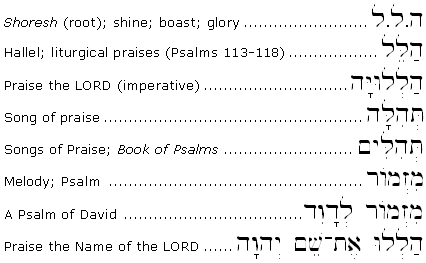|
The English word "psalm" comes from the Greek Septuagint translation of the Hebrew word mizmor, a word meaning "melody of praise." The various mizmorim (psalms) were compiled into a collection, perhaps by King David himself, and were later codified by Ezra the Scribe when the canon of the Tanakh was established.
In the Tanakh, Tehillim is one of three books of the "Wisdom Literature" (part of the Ketuvim (Writings). In effect, Tehillim is the sacred hymnal of the Jewish people. Each mizmor is ordered in Tehillim according to the Hebrew alphabet. For example, Psalm One is referred to as Mizmor Aleph, Psalm Two as Mizmor Bet, Psalm 23 as Mizmor Kaf-Gimmel, and so on (click here for more information about using Hebrew letters as numbers).
Daily Readings
In addition to daily Torah and Talmud readings, many Orthodox Jews will read a daily portion from Tehillim (the 150 mizmorim are divided into 30 daily units -- one for each day of the Hebrew month).
The Hallel
The Hallel is a group of Psalms (113-118) that are recited (as a unit) in synagogues on joyous occasions, when the praise of God is particularly appropriate (and also immediately following the Shacharit Amidah). These occasions include the following:
- The three major festivals: Pesach, Shavu'ot and Sukkot
- During Chanukah
- During Rosh Chodesh (Beginnings of New Months)
About the word "Hallelujah!"
Notice that the word "Hallelujah" is not itself a praise to the LORD, but rather is the plural imperative form of the verb Halal, meaning "You praise the LORD!" (see Psalm 111; 112; 113; 117; 135; 146, 147, 148, 149, 150). Hallelu et-shem Adonai is thus a command to "praise the Name of the LORD!"
<< Return
|


